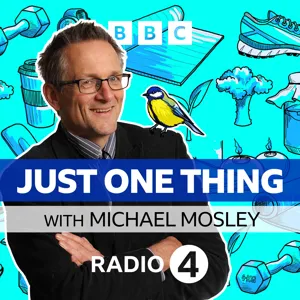Podcast Summary
Boosting Mental and Physical Well-Being through Playing a Musical Instrument: Playing a musical instrument, even for short sessions, can enhance memory, lift mood, and decrease inflammation. It's an affordable hobby with free online tutorials.
There are simple and effective ways to enhance both our mental and physical well-being, and learning to play a musical instrument is one such way. This was the topic of the latest episode of the Just One Thing podcast with Michael Mosley. While it might seem intimidating for those who didn't pick up an instrument as children, research shows that even short practice sessions can have impressive benefits, such as boosting memory, lifting mood, and reducing chronic inflammation. Plus, it doesn't have to be an expensive hobby, as there are plenty of free tutorials available online. So, whether you're a beginner or have some experience, consider giving it a try and take your love for music to the next level. And, if you're in the market for a special piece of jewelry, like an engagement ring, consider checking out Blue Nile for a wide selection and convenient online shopping experience. Lastly, for those who enjoy listening to podcasts, BBC Sounds offers a variety of options, including Just One Thing, which is released every Thursday and can be accessed for free.
Learning a Musical Instrument Boosts Mental and Physical Health: Playing a musical instrument, whether it's the guitar, ukulele, or any other instrument, can improve mental health by reducing anxiety and depression, enhancing senses, and boosting working memory. It also has physical benefits, such as improved inflammation markers.
Playing a musical instrument, whether it's the guitar, ukulele, or any other instrument, can have numerous benefits for both your mental and physical health. During our conversation, Matthew shared his desire to learn the guitar but expressed concerns about the difficulty as a beginner. I suggested starting with the ukulele, which is an easier option for beginners and more affordable. Throughout history, humans have been making music for thousands of years, and there is evidence that playing an instrument, even poorly, can improve mental health. In a study, participants who played the drums for 90 minutes a week experienced a significant reduction in anxiety and depression, and these effects were maintained for three months after the sessions ended. Furthermore, the study found that the drum players also had improved markers of inflammation, which are linked to many mental health conditions. Additionally, playing an instrument can enhance your senses by providing multisensory training. A small study from the University of Bath showed that doing an hour of piano lessons a week for 11 weeks enhanced volunteers' ability to process sight and sound. Learning to play an instrument can also boost your working memory, which is crucial for planning and problem-solving. So, whether you're looking to improve your mental health, sharpen your senses, or just learn a new skill, consider picking up a musical instrument. It's never too late to start!
Musical activities enhance working memory and fine motor skills in older adults: Musical training improves working memory, fine motor skills, and cognitive functions like executive functions, divided attention, and inhibitory control in older adults, leading to better mood and emotional state.
Engaging in musical activities, such as playing an instrument like the piano or percussion, can significantly improve both working memory and fine motor skills in older adults. Additionally, musical training has been shown to enhance cognitive functions like executive functions, divided attention, and inhibitory control, which are crucial for everyday life activities. These benefits extend beyond just enjoying music and can lead to improved mood and emotional state. It's never too late to start learning a musical instrument, and the rewards can be both motivating and cognitively beneficial.
Musical Training Engages Multiple Brain Areas: Musical training activates various brain areas, enhancing auditory processing, visual processing, emotions, and motor coordination. Benefits apply to all instruments, and learning can be enjoyable and mood-boosting.
Learning to play a musical instrument offers numerous benefits for brain health and development, regardless of age or skill level. This is because musical training activates various brain areas related to auditory processing, visual processing, emotions, and motor coordination, making it a unique and powerful way to engage the brain. Studies have shown that musicians have more developed areas of the brain in relation to auditory processing and visospatial perception due to the fine motor control and reading of musical notations required. The impact of musical training is not limited to the piano, but rather, it applies to all musical instruments. Furthermore, the process of learning to play an instrument can be enjoyable, calming, and even boost mood and brain power. For those who may feel intimidated or naive, it's important to remember that the act of trying and making progress, no matter how small, can be beneficial. Matthew's experience with the ukulele is a great example of the rewards that come from pushing oneself to learn a new skill. So, if you're considering taking up an instrument, don't hesitate – the benefits for your brain and overall well-being are well worth it.
Explore simple activities for improved wellbeing: Singing, meditation podcasts, and affordable luxury fashion can boost mood, offer cognitive benefits, and enhance your daily life
Incorporating simple activities into your daily routine can have significant positive impacts on both your physical and mental wellbeing. Singing, for instance, not only provides mood-boosting benefits but also offers cognitive advantages. You can explore more about the benefits of singing in a previous episode of "Just One Thing" on BBC Sounds. Another way to unwind and improve your mental health is by listening to music and meditation podcasts. These podcasts offer guided meditations, inspirational stories, and beautiful music, allowing you to press pause and give yourself some much-needed brain space. Additionally, you don't have to break the bank to enjoy high-quality fashion. Quince, an online retailer, offers luxury essentials at affordable prices, with savings of up to 80% compared to similar brands. Plus, they prioritize safe, ethical, and responsible manufacturing, ensuring you can look good and feel good about your purchases. In summary, singing, meditation podcasts, and affordable luxury fashion are simple yet effective ways to enhance your life. So, why not give them a try? Whether it's through singing along to your favorite tunes, unwinding with a calming podcast, or treating yourself to a beautiful cashmere sweater, these activities can make a real difference in your daily life.






